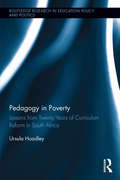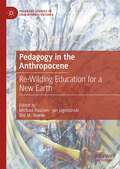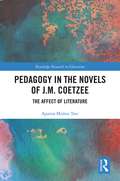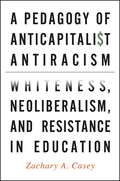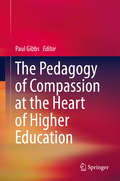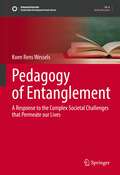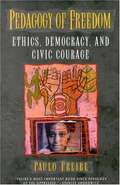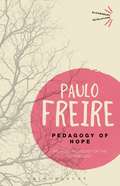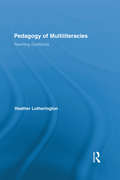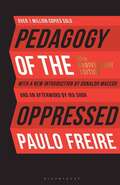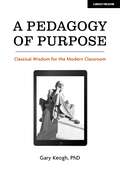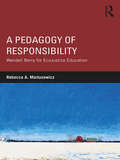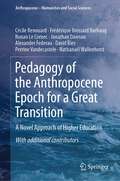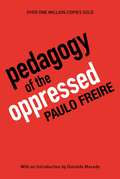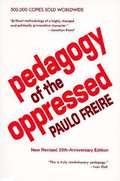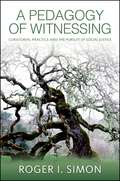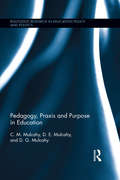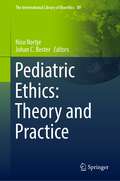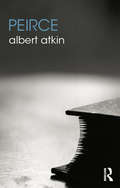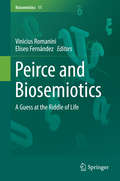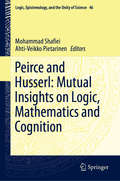- Table View
- List View
Pedagogy in Higher Education
by Gordon Wells Anne EdwardsWhat can Cultural Historical Activity Theory (CHAT) contribute to the solution of the problems facing higher education today? This edited volume brings together the work of an international group of scholars and researchers to address this important question. Drawing on contemporary interpretations of CHAT, the contributors take on a wide range of issues, ranging from pedagogy to administration and from teacher preparation to university outreach. An introduction presents the key principles of CHAT. Subsequent chapters address such issues as effective ways of teaching large undergraduate classes, providing support for struggling writers or for students with disabilities, opening up opportunities for students from historically underserved communities, preparing students for the professions, and building bridges between higher education and the wider community. Readers with an interest in higher education will encounter ideas in these chapters that will prompt them to rethink their role in preparing today's students for tomorrow's challenges.
Pedagogy in Poverty: Lessons from Twenty Years of Curriculum Reform in South Africa (Routledge Research in Education Policy and Politics)
by Ursula HoadleyAs South Africa transitioned from apartheid to democracy, changes in the political landscape, as well as educational agendas and discourse on both a national and international level, shaped successive waves of curriculum reform over a relatively short period of time. Using South Africa as a germane example of how curriculum and pedagogy can interact and affect educational outcomes, Pedagogy in Poverty explores the potential of curricula to improve education in developing and emerging economies worldwide, and, ultimately, to reduce inequality. Incorporating detailed, empirical accounts of life inside South African classrooms, this book is a much-needed contribution to international debate surrounding optimal curriculum and pedagogic forms for children in poor schools. Classroom-level responses to curriculum policy reforms reveal some implications of the shifts between a radical, progressive approach and traditional curriculum forms. Hoadley focuses on the crucial role of teachers as mediators between curriculum and pedagogy, and explores key issues related to teacher knowledge by examining the teaching of reading and numeracy at the foundational levels of schooling. Offering a data-rich historical sociology of curriculum and pedagogic change, this book will appeal to academics, researchers and postgraduate students in the fields of education, sociology of education, curriculum studies, educational equality and school reform, and the policy and politics of education.
Pedagogy in the Anthropocene: Re-Wilding Education for a New Earth (Palgrave Studies in Educational Futures)
by Jan Jagodzinski Michael Paulsen Shé M. HawkeThis book explores new pedagogical challenges and potentials of the Anthropocene era. The authors argue that this new epoch, with an unstable climate, new kinds of globally spreading viruses, and new knowledges, calls for a new way of educating and an alertness to new philosophies of education and pedagogical imaginations, thoughts, and practices. Addressing the linkages between the Anthropocene and Pedagogy across a broad pedagogical spectrum that is both formal and informal, the editors and their contributors emphasize a re-imagining of education that serves to deepen our understanding of the capacities and values of life.
Pedagogy in the Novels of J.M. Coetzee: The Affect of Literature (Routledge Research in Education)
by Aparna Mishra TarcCritically analyzing the representation of pedagogy in the novels of J.M. Coetzee, this insightful text illustrates the author’s profound conception of learning and personal development as something which takes place well beyond formal education. Bringing together critical and educational theory, Pedagogy in the Novels of J.M. Coetzee examines depictions of pedagogy in novels including Age of Iron, Elizabeth Costello, Disgrace, and Childhood of Jesus. Engaging with Coetzee’s varied literary use of pedagogical themes such as motherhood, maternal love, and the importance of childhood interactions, reading, and experiences, chapters demonstrate how Coetzee foregrounds pedagogy as intrinsic to the formation of human actors, society, and civilization. The text thereby aptly explores and broadens our understanding of education - what it is, what it achieves, and how it can affect and shape human existence. This text will be of great interest to graduate and postgraduate students, academics, researchers and professionals in the fields of pedagogy, postcolonial studies, educational theory and philosophy, and English literature.
A Pedagogy of Anticapitalist Antiracism: Whiteness, Neoliberalism, and Resistance in Education
by Zachary A. CaseyWinner of the 2018 Outstanding Book Award presented by the Society of Professors of EducationThrough an analysis of whiteness, capitalism, and teacher education, A Pedagogy of Anticapitalist Antiracism sheds light on the current conditions of public education in the United States. We have created an environment wherein market-based logics of efficiency, lowering costs, and increasing returns have worked to disadvantage those populations most in need of educational opportunities that work to combat poverty. This book traces the history of whiteness in the United States with an explicit emphasis on the ways in which the economic system of capitalism functions to maintain historical practices that function in racist ways. Practitioners and researchers alike will find important insights into the ways that the history of white racial identity and capitalism in the United States impact our present reality in schools. Casey concludes with a discussion of "revolutionary hope" and possibilities for resistance to the barrage of dehumanizing reforms and privatization engulfing much of the contemporary educational landscape.
The Pedagogy of Compassion at the Heart of Higher Education
by Paul GibbsThis book offers a moral rather than instrumental notion of university education whilst locating the university within society. It reflects a balancing of the instrumentalization of higher education as a mode of employment training and enhances the notion of the students' well-being being at the core of the university mission. Compassion is examined in this volume as a weaving of diverse cultures and beliefs into a way of recognizing that diversity through a common good offers a way of preparing students and staff for a complex and anxious world. This book provides theoretical and practical discussions of compassion in higher education, it draws contributors from around the world and offers illustrations of compassion in action through a number of international cases studies. .
Pedagogy of Entanglement: A Response to the Complex Societal Challenges that Permeate our Lives (Sustainable Development Goals Series)
by Koen Rens WesselsIn this hyperconnected, dynamic world we live in, permeated by profound challenges and transformations, the awareness of complexity is unequivocally on the rise. This monograph argues that it is high time that our educational institutions and pedagogical approaches come to mirror this growing awareness, to assist and inspire humanity to embrace complexity, to learn to move within it with increasing sensitivity and wisdom. Doing so is necessary, for if there is one thing that the years behind us bear witness of, it is that the tendency and attempt to simplify, separate, control, and indeed exploit has – as the dark side of the advancements of modern life – brought upon us unprecedented ecological and humanitarian crises. Schools, notably, are not closed spaces separated from society but open places within society, and as such they are inevitably complicit in the (re)shaping of our shared world. This book, therefore, proposes an ambitious pedagogical agenda. Specifically, it explores the relational ontological premise of entanglement in the context of pedagogical theory, raising the question of how, as teachers, we might meaningfully and responsibly engage with the myriad ways in which students are simultaneously shaped-by and shapers-of contemporary societal challenges. In close collaboration with twelve teachers as co-researchers, the book offers six ''helpful perspectives'' for teachers seeking to embrace such complexity in their own practices, referred to as: (1) entanglement-orientedness, (2) entanglement-awareness, (3) hopeful action, (4) inquiry within entangled phenomena, (5) practicing perceptiveness, and (6) practicing integrity.
Pedagogy of Freedom: Ethics, Democracy And Civic Courage
by Paulo Freire Patrick ClarkeThis book displays the striking creativity and profound insight that characterized Freire's work to the very end of his life-an uplifting and provocative exploration not only for educators, but also for all that learn and live.
Pedagogy Of Hope
by Paulo FreireWith the publication of Pedagogy of the Oppressed, Paulo Freire established himself as one of the most important and radical educational thinkers of his time. In Pedagogy of Hope, Freire revisits the themes of his masterpiece, the real world contexts that inspired them and their impact in that very world. Freire's abiding concern for social justice and education in the developing world remains as timely and as inspiring as ever, and is shaped by both his rigorous intellect and his boundless compassion. Pedagogy of Hope is a testimonial to the inner vitality of generations denied prosperity and to the often-silent, generous strength of millions throughout the world who refuse to let hope be extinguished.
Pedagogy of Multiliteracies: Rewriting Goldilocks (Routledge Research in Education)
by Heather LotheringtonA CHOICE Outstanding Academic Title 2012! Based on case studies from public schools in Toronto, Canada, this book chronicles an inspiring five-year journey to develop thinking about and teaching literacy for the 21st century. The research, which was classroom-based and developed by public school teachers in collaboration with university researchers, was stimulated by an ethnographic study at Joyce Public School to track children learning to read in an era of multiliteracies. Following the kindergarteners’ interest in Goldilocks and the Three Bears, Lotherington asked the principal: What would Goldilocks look like, retold through the eyes of the children? The resulting classroom experiment to transform learning to read a storybook into multimodal collaborative story-telling sparked the development of an award-winning school-university learning community dedicated to the development of multimodal literacies in the culturally diverse, urban classroom. Pedagogy of Multiliteracies tells the evolving story of teachers’ trial-and-error interventions to engage children in multiple modes of expression involving structured play with contemporary media. Using the complex texts created, the teachers carve spaces to welcome the voices of children and the languages of the community into the English-medium classroom.
Pedagogy Of The Oppressed: 50th Anniversary Edition
by Paulo Freire Donaldo MacedoFirst published in Portuguese in 1968, Pedagogy of the Oppressed was translated and published in English in 1970. Paulo Freire's work has helped to empower countless people throughout the world and has taken on special urgency in the United States and Western Europe, where the creation of a permanent underclass among the underprivileged and minorities in cities and urban centers is ongoing. This 50th anniversary edition includes an updated introduction by Donaldo Macedo, a new afterword by Ira Shor and interviews with Marina Aparicio Barberán, Noam Chomsky, Ramón Flecha, Gustavo Fischman, Ronald David Glass, Valerie Kinloch, Peter Mayo, Peter McLaren and Margo Okazawa-Rey to inspire a new generation of educators, students, and general readers for years to come.
A Pedagogy of Purpose: Classical Wisdom for the Modern Classroom
by Dr Gary KeoghA Pedagogy of Purpose offers a completely fresh take on key problems in the education system. Gary Keogh argues that the education system has lost its way; it has become mechanistic, vapid, driven by an obsession with dubious measurements and led by a very narrow understanding of what it means to succeed. It has lost its sense of purpose. Using many real classroom examples, Keogh provides a new way forward, demonstrating how insights from classical philosophy can have a positive influence on crucial issues in education like student behaviour, assessment, attendance, the quality of teaching and learning, and perhaps most importantly, the mental health of students and teachers.
A Pedagogy of Purpose: Classical Wisdom for the Modern Classroom
by Dr Gary KeoghA Pedagogy of Purpose offers a completely fresh take on key problems in the education system. Gary Keogh argues that the education system has lost its way; it has become mechanistic, vapid, driven by an obsession with dubious measurements and led by a very narrow understanding of what it means to succeed. It has lost its sense of purpose. Using many real classroom examples, Keogh provides a new way forward, demonstrating how insights from classical philosophy can have a positive influence on crucial issues in education like student behaviour, assessment, attendance, the quality of teaching and learning, and perhaps most importantly, the mental health of students and teachers.
A Pedagogy of Responsibility: Wendell Berry for EcoJustice Education
by Rebecca A. MartusewiczDrawing on the theories of author and conservationist Wendell Berry for the field of EcoJustice Education, this book articulates a pedagogy of responsibility as a three-pronged approach grounded in the recognition that our planet balances an essential and fragile interdependence between all living creatures. Examining the deep cultural roots of social and ecological problems perpetuated by schools and institutions, Martusewicz identifies practices, relationships, beliefs, and traditions that contribute to healthier communities. She calls for imaginative re-thinking of education as an ethical process based in a vision of healthy, just, and sustainable communities. Using a critical analytical process, Martusewicz reveals how values of exploitation, mastery, and dispossession of land and people have taken hold in our educational system and communities, and employs Berry’s philosophy and wisdom to interrogate and develop a "pedagogy of responsibility" as an antidote to such harmful ideologies, structures, and patterns. Berry’s critical work and the author’s relatable storytelling challenge taken-for-granted perspectives and open new ways of thinking about teaching for democratic and sustainable communities.
Pedagogy of the Anthropocene Epoch for a Great Transition: A Novel Approach of Higher Education (Anthropocene – Humanities and Social Sciences)
by Cécile Renouard Frédérique Brossard Børhaug Ronan Le Cornec Jonathan Dawson Alexander Federau David Ries Perrine Vandecastele Nathanaël WallenhorstThis book functions as a practical guide to support teachers and higher education institutions in the construction of their courses and programmes in light of the Anthropocene. It is divided into two complementary parts. The first part lays the theoretical foundations of what is a transition pedagogy and provides a pedagogical framework. It offers practical tools and didactic levers to be used by teachers and institutions to build a truly transformative pedagogy for students, with reference to universities already experimenting such alternative methods. The second part presents an analysis of the pedagogical tools and levers experienced in worldwide institutions, by teachers, as well as philosophers and experts of pedagogy. The authors of this book advocate for an embodied pedagogy which not only gives students access to content but also to ways of thinking and acting in all conscience. A pedagogy of the Anthropocene epoch therefore encourages the mobilization of reason, emotions and senses as well as systemic reflection in the questioning of our lifestyles and the development of transversal skills. Based on internationally recognized research and practical experiences of institutions and teachers all over the western world, this book gathers the knowledge and experience of professors and researchers, coming from a wide variety of disciplines and cultural context. Their reflections have led them to develop a “head-heart-body approach” and a “6 Gates questioning method” to remodel pedagogy. This book is of interest to those working in the education sector.
Pedagogy of the Oppressed
by Paulo FreireThe methodology of the late Paulo Freire has helped to empower countless impoverished and illiterate people throughout the world. Freire's work has taken on especial urgency in the United States and Western Europe, where the creation of a permanent underclass among the underprivileged and minorities in cities and urban centers is increasingly accepted as the norm.
Pedagogy of the Oppressed
by Myra Bergman Ramos Paulo FreirePaulo Freire has perfected a method for teaching illiterates that has contributed, in an extraordinary way, to that process. In fact, those who, in learning to read and write, come to a new awareness of selfhood and begin to look critically at the social situation in which they find themselves, often take the initiative in acting to transform the society that has denied them this opportunity of participation. Education is once again a subversive force.
A Pedagogy of Witnessing: Curatorial Practice and the Pursuit of Social Justice (SUNY series, Transforming Subjects: Psychoanalysis, Culture, and Studies in Education)
by Roger I. SimonThis outstanding comparative study on the curating of "difficult knowledge" focuses on two museum exhibitions that presented the same lynching photographs. Through a detailed description of the exhibitions and drawing on interviews with museum staff and visitor comments, Roger I. Simon explores the affective challenges to thought that lie behind the different curatorial frameworks and how viewers' comments on the exhibitions perform a particular conversation about race in America. He then extends the discussion to include contrasting exhibitions of photographs of atrocities committed by the German army on the Eastern Front during World War II, as well as to photographs taken at the Khmer Rouge S-21 torture and killing center. With an insightful blending of theoretical and qualitative analysis, Simon proposes new conceptualizations for a contemporary public pedagogy dedicated to bearing witness to the documents of racism.
Pedagogy, Praxis and Purpose in Education (Routledge Research in Education Policy and Politics)
by C.M. Mulcahy D.E. Mulcahy D.G. MulcahyRecent years have shown the growth of federal legislation and programs having a profound impact on educational policy and practice, and a decline in reliance on broadly based educational justifications. Paralleling this development has been the emergence of well-endowed and influential private foundations, and an increase in corporate influence in shaping policy. In this volume the authors consider the discourse, rhetoric, and underlying values that sustain these developments alongside those that underlie more longstanding and competing educational theories and practices. This volume highlights the importance of recognizing opposing conceptualizations of education—some more educationally productive than others— and their core values, approaches to student learning, strengths and weaknesses, and justification. The authors analyze and critique what Jane Roland Martin has referred to as ‘the deep structure of educational thought’, and seek improved educational policy and practice with particular reference to curriculum and pedagogy. It features a comparative analysis of competing discourses including autocratic control, limited personal development, and praxis.
Pediatric Ethics: Theory and Practice (The International Library of Bioethics #89)
by Nico Nortjé Johan C. BesterThis book assists health care providers to understand the specific interplay of the roles and relationships currently forming the debates in pediatric clinical ethics. It builds on the fact that, unlike adult medical ethics, pediatric ethics begins within an acutely and powerfully experienced dynamic of patient-family-state-physician relationship. The book provides a unique perspective as it interacts with established approaches as well as recent developments in pediatric ethics theory, and then explores these developments further through cases. The book first focuses on setting the stage by introducing a theoretical framework and elaborating how pediatric ethics differ from non-pediatric ethics. It approaches different theoretical frameworks in a critical manner drawing on their strengths and weaknesses. It helps the reader in developing an ability to engage in ethical reasoning and moral deliberation in order to focus on the wellbeing of the child as the main participant in the ethical deliberation, as well as to be able to identify the child’s moral claims. The second section of the book focuses on the practical application of these theoretical frameworks and discusses specific areas pertaining to decision-making. These are: the critically ill child, new and enduring ethical controversies, and social justice at large, the latter of which includes looking at the child’s place in society, access to healthcare, social determinants of health, and vaccinations. With the dynamic changes and challenges pediatric care faces across the globe, as well as the changing face of new technologies, no professional working in the field of pediatrics can afford not to take due note of this resource.
Peirce (The Routledge Philosophers)
by Albert AtkinCharles Sanders Peirce (1839-1914) is generally regarded as the founder of pragmatism, and one of the greatest ever American philosophers. Peirce is also widely known for his work on truth, his foundational work in mathematical logic, and an influential theory of signs, or semiotics. Albert Atkin introduces the full spectrum of Peirce’s thought for those coming to his work for the first time. The book begins with an overview of Peirce’s life and work, considering his early and long-standing interest in logic and science, and highlighting important views on the structure of philosophical thought. Atkin then explains Peirce’s accounts of pragmatism and truth examining important later developments to these theories. He then introduces Peirce’s full accounts of semiotics, examines his foundational work on formal and graphical logic, and introduces Peirce’s account of metaphysics, the least understood aspect of his philosophy. The final chapter considers Peirce’s legacy and influence on the thought of philosophers such as John Dewey and Richard Rorty, as well as highlighting areas where Peirce’s ideas could still provide important insights for contemporary philosophers. Including chapter summaries, suggestions for further reading and a glossary, this invaluable introduction and guide to Peirce’s philosophy is essential reading for those new to his work.
Peirce and Biosemiotics
by Vinicius Romanini Eliseo FernándezThis volume discusses the importance of Peirce´s philosophy and theory of signs to the development of Biosemiotics, the science that studies the deep interrelation between meaning and life. Peirce considered semeiotic as a general logic part of a complex architectonic philosophy that includes mathematics, phenomenology and a theory of reality. The authors are Peirce scholars, biologists, philosophers and semioticians united by an interdisciplinary endeavor to understand the mysteries of the origin of life and its related phenomena such as consciousness, perception, representation and communication.
Peirce and Husserl: Mutual Insights on Logic, Mathematics and Cognition (Logic, Epistemology, and the Unity of Science #46)
by Mohammad Shafiei Ahti-Veikko PietarinenThis volume aims to provide the elements for a systematic exploration of certain fundamental notions of Peirce and Husserl in respect with foundations of science by means of drawing a parallelism between their works. Tackling a largely understudied comparison between these two contemporary philosophers, the authors highlight the significant similarities in some of their fundamental ideas. This volume consists of eleven chapters under four parts. The first part concerns methodologies and main principles of the two philosophers. An introductory chapter outlines central historical and systematical themes arising out of the recent scholarship on Peirce and Husserl. The second part is on logic, its Chapters dedicated to the topics from Peirce’s Existential Graphs and the philosophy of notation to Husserl’s notions of pure logic and transcendental logic. The third part includes contributions on philosophy of mathematics. Chapters in the final part deal with the theory of cognition, consciousness and intentionality. The closing chapter provides an extended glossary of central terms of Peirce’s theory of phaneroscopy, explaining them from the viewpoint of the theory of cognition.
Peirce and the Conduct of Life: Sentiment and Instinct in Ethics and Religion
by Richard Kenneth AtkinsCharles Sanders Peirce (1839–1914) is regarded as the founding father of pragmatism and a key figure in the development of American philosophy, yet his practical philosophy remains under-acknowledged and misinterpreted. In this book, Richard Atkins argues that Peirce did in fact have developed and systematic views on ethics, on religion, and on how to live, and that these views are both plausible and relevant. Drawing on a controversial lecture that Peirce delivered in 1898 and related works, he examines Peirce's theories of sentiment and instinct, his defence of the rational acceptability of religious belief, his analysis of self-controlled action, and his pragmatic account of practical ethics, showing how he developed his views and how they interact with those of his great contemporary William James. This study will be essential for scholars of Peirce and for those interested in American philosophy, pragmatism, the philosophy of religion, the philosophy of action, and ethics. A rare book-length study of Peirce's practical philosophy which delves into a little-studied area of Peirce's thought. Contrasts Peirce's views with those of William James, appealing to those who have an interest in the thought of James or pragmatism more generally. Develops a detailed analysis of the increasingly popular debate on self-controlled action.
Peirce and the Threat of Nominalism
by Paul ForsterCharles Peirce, the founder of pragmatism, was a thinker of extraordinary depth and range - he wrote on philosophy, mathematics, psychology, physics, logic, phenomenology, semiotics, religion and ethics - but his writings are difficult and fragmentary. This book provides a clear and comprehensive explanation of Peirce's thought. His philosophy is presented as a systematic response to 'nominalism', the philosophy which he most despised and which he regarded as the underpinning of the dominant philosophical worldview of his time. The book explains Peirce's challenge to nominalism as a theory of meaning and shows its implications for his views of knowledge, truth, the nature of reality, and ethics. It will be essential reading both for Peirce scholars and for those new to his work.

